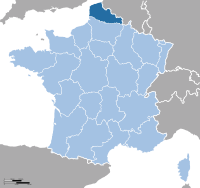Battle of Avesnes-le-Sec facts for kids
Quick facts for kids Battle of Avesnes le Sec |
|||||||
|---|---|---|---|---|---|---|---|
| Part of French Revolutionary Wars | |||||||
 The location of Nord-Pas-de-Calais, where Avesnes-le-Sec is located. |
|||||||
|
|||||||
| Belligerents | |||||||
| Commanders and leaders | |||||||
| Strength | |||||||
| 2,000 cavalry | 4,663 | ||||||
| Casualties and losses | |||||||
| 69 troops | 2,000 killed and wounded; 2,000 soldiers and 20 artillery pieces captured | ||||||
The Battle of Avesnes-le-Sec was an important fight during the French Revolutionary Wars. It happened as part of the Flanders Campaign. This battle was fought between the French army, led by General Nicolas Declaye, and the Austrian army, led by Prince of Hohenlohe-Kirchberg. The Austrian cavalry, who were soldiers on horseback, charged powerfully and won a big victory against the French.
Contents
What Led to the Battle?
In August 1793, the French Army of the North was commanded by Jean Nicolas Houchard. They were facing the Imperial Austrian army, led by Prince Coburg. Houchard was busy moving his troops to help the city of Dunkirk. This led to another battle called the Battle of Hondschoote.
At the same time, fighting was happening in the southern part of Flanders. The city of Le Quesnoy was under siege. Prince Coburg's forces had pushed the French back. They began to surround Le Quesnoy with their troops. General Houchard ordered two groups of soldiers to try and help the city.
The Battle Begins
On the evening of September 11, two groups of French soldiers got ready to march. Their goal was to attack the Austrian forces surrounding Le Quesnoy.
The First French Attack
One group, led by Jean Alexander Ihler, left Maubeuge with 14,000 men. They marched through Landrecies and Avesnes, gathering more soldiers. They attacked the Austrian forces. However, they were pushed back and had to retreat in great confusion.
Declaye's Column Marches
The second group was led by General Nicolas Declaye. This group started with 2,500 infantry (foot soldiers), 240 cavalry (horse soldiers), and 120 gunners from Cambrai. Most of these soldiers were new recruits and had not fought in battle before.
They left Cambrai at 1:00 AM on September 12. The church bells were ringing, celebrating news of Houchard's victories. They were joined by about 1,300 men from Bouchain. This gave Declaye a total of 4,663 soldiers. However, it left both Cambrai and Bouchain almost undefended.
The Austrian Cavalry Charge
Declaye's column marched through Avesnes-le-Sec. Then, they turned left towards the Austrian camp at Solesmes. Suddenly, Prince Hohenlohe appeared with 2,000 Austrian cavalrymen.
Declaye tried to pull his soldiers back towards Avesnes-le-Sec. But the Austrian cavalry squadrons charged quickly. They scattered the French cavalry, who ran away towards Bouchain. General Declaye himself also fled.
The French infantry tried to form a defensive square formation near Avesnes. This formation helps protect against cavalry. However, these untrained soldiers were completely overwhelmed by the Austrian cavalry, led by Lichtenstein. The Austrians attacked fiercely. The French lost about 2,000 soldiers who were killed or wounded. The Austrians, on the other hand, lost only 69 men. In addition, 2,000 French soldiers and 18 cannons were captured by the Austrians.
What Happened After the Battle?
If Prince Coburg had continued his attack after this victory, he would have found Cambrai and Bouchain almost empty of soldiers. These cities would have been easy to capture. However, the Austrians decided to focus on surrounding Maubeuge instead.
General Declaye was arrested because of how he led his troops in the battle. But he managed to avoid punishment. This was likely because he was a strong supporter of the French Republic and had important political connections.
 | Bayard Rustin |
 | Jeannette Carter |
 | Jeremiah A. Brown |

